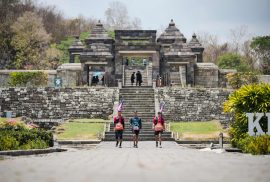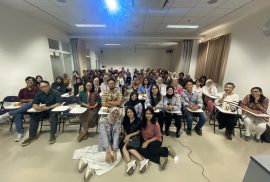
The Undergraduate Tourism Study Program at the Faculty of Cultural Sciences, Universitas Gadjah Mada (UGM), continues to strengthen the role of Indonesian academics in promoting fairer and more inclusive cultural heritage repatriation practices. Dr. Rucitarahma Ristiawan (Lecturer, Undergraduate Tourism Study Program, FIB UGM) and Dr. Tular Sudarmadi (Lecturer, Department of Archaeology UGM and Undergraduate Tourism Study Program UGM) actively participated in a series of workshops and public lectures titled “Epistemic Injustice in Indonesian Heritage Policy and Practice.” This event was attended by the University of Glasgow, the Hunterian Museum in Glasgow, the National Museum of Scotland, and the Scottish Centre for Crime and Justice. The agenda was held at the University of Glasgow, the Hunterian Museum in Glasgow, and the National Museum of Scotland in Edinburgh, from May 9 to May 17, 2025.
 Dr. Tular Sudarmadi and Dr. Rucitarahma Ristiawan collaborated with the Hunterian Museum and the National Museum of Scotland in a workshop that addressed issues related to the repatriation of cultural heritage.
Dr. Tular Sudarmadi and Dr. Rucitarahma Ristiawan collaborated with the Hunterian Museum and the National Museum of Scotland in a workshop that addressed issues related to the repatriation of cultural heritage.
This activity is part of an exploratory project aimed at mapping the views of formal stakeholders in Indonesia, such as government officials and museum representatives, regarding the protection and ownership of cultural heritage. Dr. Tular and Dr. Rucitarahma are of the view that, until now, the process of protecting and repatriating cultural heritage in Indonesia has been dominated by a top-down approach and has been a state-to-state initiative led directly by the government, without involving or prioritizing the voices of the communities of origin who have a direct connection to the heritage.
The results of this mapping will later be compared with the perspectives of the communities of origin, which have been collected through the Global Knowledge Exchange Fund (GKEF) 2023-2024 program. This comparison is expected to become the basis for a subsequent research funding proposal that will design a cultural heritage policy model in Indonesia with a more participatory and community-based justice approach. The main focus is not only on the physical return of objects but also on the restoration of the identity and cultural knowledge inherent in the communities that own the heritage.
This agenda aligns with SDG 16: Peace, Justice, and Strong Institutions, which promotes fairer and more inclusive cultural heritage governance, as well as SDG 17: Partnerships for the Goals, by strengthening collaboration between educational institutions, museums, and communities.
As part of the series of events, Dr. Tular and Dr. Rucitarahma also delivered a public lecture titled “Epistemic Injustice in Indonesian Heritage Policy and Practice.” In the lecture, Dr. Rucitarahma presented on cultural heritage and tourism visits as multispecies encounters, highlighting the interconnectedness between humans, ancestors, fossils, landscapes, and non-human beings at two Indonesian heritage sites: Sangiran and Liang Bua. Meanwhile, Dr. Tular Sudarmadi discussed how the Dutch colonial legacy affects the repatriation process of Indonesian cultural heritage, the challenges it poses, and the steps the government needs to take so that these cultural objects can be returned to their rightful owners.

This activity contributes to supporting SDG 4: Quality Education, by opening a space for critical dialogue and encouraging cross-cultural knowledge exchange as part of inclusive global learning.




